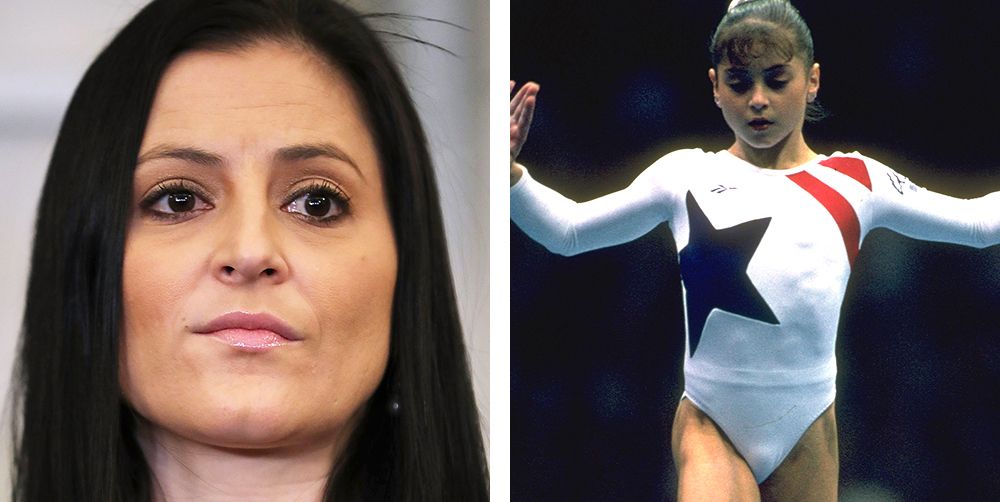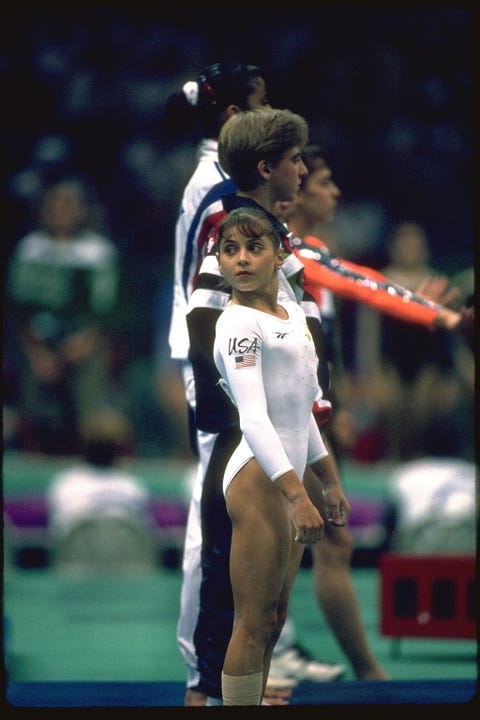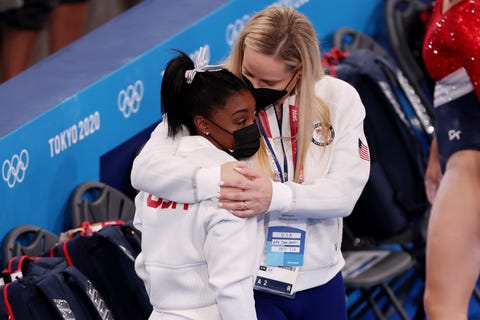Products You May Like
Dominique Moceanu is one of a select few who understands the pressure of being an Olympic gymnast. In 1996, the now-retired athlete was part of the Magnificent Seven, the moniker given to the historic U.S. women’s gymnastics team that won the nation its first-ever gold in the team event. At just 14 years old, Moceanu became the youngest Olympic gold medalist in U.S. gymnastics history. But behind the scenes, things weren’t so idyllic.
In a recent tweet, Moceanu shared a heartbreaking video from those games: a recap of her balance beam routine where you can see the young gymnast fall and hit her head on the apparatus. Afterwards, she walks to the sidelines to recover, alone. In her tweet, Moceanu wrote: “I was 14 y/o w/ a tibial stress fracture, left alone w/ no cervical spine exam after this fall. I competed in the Olympic floor final minutes later.”
This content is imported from Twitter. You may be able to find the same content in another format, or you may be able to find more information, at their web site.
She then praised Simone Biles’s recent decision to withdraw from most of her events at the Tokyo Olympics in order to focus on her mental health. Biles, who’s widely considered the greatest gymnast of all time, has since explained that she’s suffering from the “twisties,” a mental block that makes it difficult for gymnasts to recognize where they are in the air. While she qualified for every event in women’s gymnastics at this year’s games, she’s chosen to only compete in the balance beam final on Tuesday.
“@Simone_Biles decision demonstrates that we have a say in our own health—‘a say’ I NEVER felt I had as an Olympian,” Moceanu wrote. “In our sport, we essentially dive into a pool w/ no water. When you lose your ability to find the ground—which appears to be part of @Simone_Biles decision—the consequences can be catastrophic. She made the right decision for the team & herself.”
For Moceanu, there’s a stark difference between how today’s athletes are able to advocate for their own health and what she experienced as a frightened teenager in the ‘96 Olympic Games. Below, she speaks candidly to ELLE.com about what really happened after her beam routine—and why gymnastics is finally changing for the better.
The video of you hitting on your head on the beam is tough to watch. Do you remember those moments right after your fall?
I was more terrified about getting yelled at by [former USA Gymnastics coach and national team coordinator] Martha Karolyi than my own well-being. I saw her from the corner of my eye when I grabbed the beam. I was thinking, She’s so disappointed in me. She’s going to kill me. I’m a worthless failure in her eyes at this moment. But I told myself, “I’m going to hang onto this beam for dear life. I’m not going to touch that floor, whatever it takes.” And after, she just walked away. You can see what happened and how alone I was in that moment. I think the video is very telling about how no one cared about us at that time.
When you see someone land on their head, you understand why our sport can be so dangerous. And that’s where we bring up the topic of Simone. When you’re not in that right state of mind, and if you’re not thinking correctly, and if you don’t feel safe, you have to be careful because things like that can happen very quickly. I’ve been in communication with Simone, and I know that this is weighing heavily on her. When you have the “twisties,” as we call them, you suddenly don’t know when to twist, you don’t know where your spacial awareness is. And that’s very scary. She’s carrying a lot right now. I know that everybody’s support is helping her, but it’s very heavy on her.
It’s also distressing to know that you had to go compete right afterwards. What was going through your mind at the time? What were the people around you saying?
Nobody cared about how I felt, so I internalized everything. It was a matter of shifting gears and thinking, You have to go compete in front of the world. Let go of beam. See if you can medal on floor. Somehow, I have to redeem myself.
My coaches did not place me in the right mindset. I can guarantee you, if I had a different mindset, that day could’ve gone very differently. I didn’t have any checkup [after the fall]. It was just like, “Who cares? You need to be a machine, and you need to go.” It would have been nice to have that choice [of whether to compete or not]. Of course, in the moment, I thought, I’m going to go no matter what, because I was so conditioned that way. It’s just unfortunate that there was a lack of compassion and care and attentiveness for this 14-year-old kid.
How did you feel seeing Simone step away during this Olympics? If you had seen people like Simone do that when you were younger, do you think you would’ve made different decisions?
Even if I would have seen somebody do that, it wasn’t an option in our generation and in our time. I can tell you with 100 percent certainty that would not have been allowed. We weren’t allowed a voice. But seeing Simone do that now, it was such a sign of her strength and maturity. For her to say, “I am not safe. I do not feel comfortable, and I need to do what’s right for me and the team.” That was the best decision, and I think it shows she has a voice in this, and she needs to because it’s her body up there in the air. It’s a good moment in history to say, “Hey, this is shifting.” The conversation about mental health and physical well-being is shifting. Even during the previous Olympics, that was not the case.
Many have also been rethinking your teammate Kerri Strug’s famous vault at the 1996 Olympics. During her first vault, she fell and hurt her ankle, but performed her second vault anyway. At the time, it was seen as heroic, but now people are saying she shouldn’t have had to risk her safety. How did you feel about it at the time, and have your feelings changed over the years?
Had she had a choice, I don’t know what she would have done. We were so conditioned back then. Had the coaches done the calculations and told her, “You don’t need to vault, we already won,” she might’ve been like, “That relieves the pressure, why do it and hurt myself?” Because she didn’t know what was going to happen. [Editor’s note: It was widely believed, because Moceanu fell on both her vaults right before, that Strug had to complete her second vault in order for Team USA to win gold. In reality, the team was far enough ahead that they likely could’ve won without Strug’s second score, though it’s up for interpretation whether the coaches knew this at the time.]
Even then I thought, She’s going off in massive pain. I don’t know how that’s good for her or for anybody. But we couldn’t articulate things at that time. It’s really hard to say what anybody would have done because the choices were never there for us. It would have changed so much in our careers had we been allowed to have any kind of voice without a backlash in the gym. It definitely makes you think, and you examine the past so you can make the future better.
This content is imported from YouTube. You may be able to find the same content in another format, or you may be able to find more information, at their web site.
People still think that Kerri had to vault in order for the team to win. But like you said, that wasn’t the case.
No, my [vault] scores were enough. We still would have won. The team competition was tape delayed, so NBC knew the results and built up the story. And that’s fine—I understand people want to make a story out of certain things. But you shouldn’t do it by doing someone else a disservice. You have to be careful with some of those stories, because it left an impression on the world that I could have lost it for the team, and that wasn’t the case. It may not have been the fairytale they wanted to present, but at the same time, I didn’t lose it, and it made it appear that way. That hurt me for years. I had nothing to be disappointed about, yet I was made to feel like a failure because of how things were depicted.
What changes do you hope to see in future Olympics so that gymnasts are able to take care of and speak up for themselves?
I think we’re trending upward right now. Being able to have a voice and say what you want in your competitive life is an important thing. Mental and physical safety should always be No. 1. We need to continue that on the elite level, all the way down to the lower levels. That is only going to lead to more positive—and healthier—results for our athletes.
This interview has been edited and condensed for clarity.
This content is created and maintained by a third party, and imported onto this page to help users provide their email addresses. You may be able to find more information about this and similar content at piano.io


